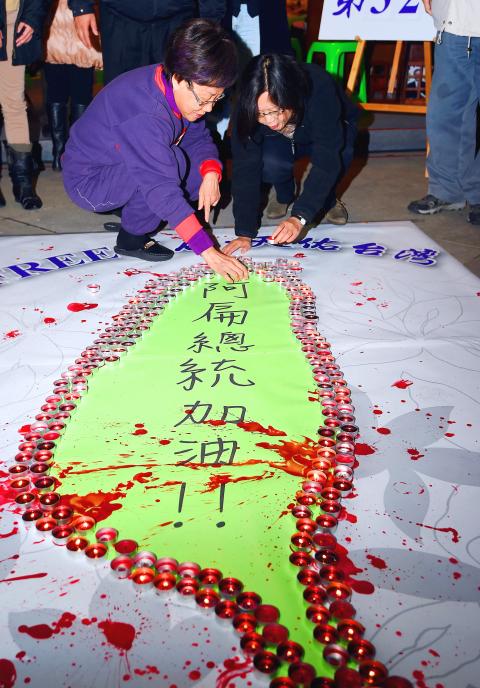Amid reports that former president Chen Shui-bian (陳水扁) might be granted medical parole and released from Taichung Prison soon, the Ministry of Justice’s Agency of Corrections yesterday said it has not received from prison authorities the report by Taichung Veterans General Hospital recommending that he be paroled.
An ad hoc medical assessment team met on Monday for the third time to assess Chen’s health and yesterday relayed its unanimous decision that he be granted parole to officials at Taichung Prison, where he is serving a 20-year sentence for corruption.
The team members said they felt Chen’s medical problems could not be properly treated in jail. However, their proposal still has to be submitted to the Agency of Corrections for approval.

Photo: Fang Pin-chao, Taipei Times
Deputy Minister of Justice Chen Ming-tang (陳明堂) yesterday said that no timetable has been set for Chen’s medical parole application to be completed.
The ministry said the 15-member medical team made an initial recommendation. The Taichung hospital then compiled a report on the matter and sent it to the prison, before submitting a proposal to the Agency of Corrections.
If the agency grants Chen parole, the necessary documents will be sent to the Taichung District Prosecutors’ Office for approval, in line with parole regulations.
Chen Ming-tang said that if the former president is released, his parole period will be limited to one month and when that time is about to end, the prison would dispatch officials to check on his condition.
If he has not improved, the ministry would assess whether to extend the parole period by one to three months, he said.
The ex-president’s family and supporters were riled by what they said were deliberate moves by the ministry to use bureaucratic regulations and technicalities to make the process as long as possible.
Democratic Progressive Party (DPP) spokesman Huang Di-ying (黃帝穎) said the medical team reached a consensus and urged the ministry to respect it and “not use red tape to postpone it.”
DPP Legislator Kuan Bi-ling (管碧玲), who visited Chen Shui-bian yesterday, said the former president was restless because he feared the report might be changed before it is sent to the ministry.
Former vice president Annette Lu (呂秀蓮), who began a hunger strike on Sunday to push for Chen Shui-bian’s parole, said that if he is not released by today she would stage a sit-in at the Presidential Office Building in Taipei.
A group of Chen Shui-bian’s supporters gathered outside Taichung Prison yesterday to wait for news of his release.
Chen Shui-bian began serving his sentence on Nov. 11, 2010, but had been detained for nearly two years prior to that as the cases against him were processed.
He is said to be suffering from depression, brain degeneration, trembling hands and urinary incontinence, among other things.
Additional reporting by Jason Pan

The US government has signed defense cooperation agreements with Japan and the Philippines to boost the deterrence capabilities of countries in the first island chain, a report by the National Security Bureau (NSB) showed. The main countries on the first island chain include the two nations and Taiwan. The bureau is to present the report at a meeting of the legislature’s Foreign Affairs and National Defense Committee tomorrow. The US military has deployed Typhon missile systems to Japan’s Yamaguchi Prefecture and Zambales province in the Philippines during their joint military exercises. It has also installed NMESIS anti-ship systems in Japan’s Okinawa

‘WIN-WIN’: The Philippines, and central and eastern European countries are important potential drone cooperation partners, Minister of Foreign Affairs Lin Chia-lung said Minister of Foreign Affairs Lin Chia-lung (林佳龍) in an interview published yesterday confirmed that there are joint ventures between Taiwan and Poland in the drone industry. Lin made the remark in an exclusive interview with the Chinese-language Liberty Times (the Taipei Times’ sister paper). The government-backed Taiwan Excellence Drone International Business Opportunities Alliance and the Polish Chamber of Unmanned Systems on Wednesday last week signed a memorandum of understanding in Poland to develop a “non-China” supply chain for drones and work together on key technologies. Asked if Taiwan prioritized Poland among central and eastern European countries in drone collaboration, Lin

Renewed border fighting between Thailand and Cambodia showed no signs of abating yesterday, leaving hundreds of thousands of displaced people in both countries living in strained conditions as more flooded into temporary shelters. Reporters on the Thai side of the border heard sounds of outgoing, indirect fire yesterday. About 400,000 people have been evacuated from affected areas in Thailand and about 700 schools closed while fighting was ongoing in four border provinces, said Thai Rear Admiral Surasant Kongsiri, a spokesman for the military. Cambodia evacuated more than 127,000 villagers and closed hundreds of schools, the Thai Ministry of Defense said. Thailand’s military announced that

CABINET APPROVAL: People seeking assisted reproduction must be assessed to determine whether they would be adequate parents, the planned changes say Proposed amendments to the Assisted Reproduction Act (人工生殖法) advanced yesterday by the Executive Yuan would grant married lesbian couples and single women access to legal assisted reproductive services. The proposed revisions are “based on the fundamental principle of respecting women’s reproductive autonomy,” Cabinet spokesperson Michelle Lee (李慧芝) quoted Vice Premier Cheng Li-chiun (鄭麗君), who presided over a Cabinet meeting earlier yesterday, as saying at the briefing. The draft amendment would be submitted to the legislature for review. The Ministry of Health and Welfare, which proposed the amendments, said that experts on children’s rights, gender equality, law and medicine attended cross-disciplinary meetings, adding that